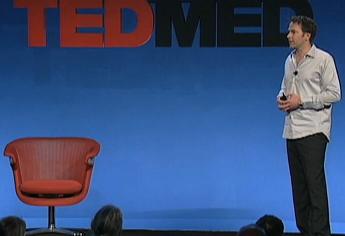
Jamie Heywood is out to convince you that the most powerful tool in medicine is information. He is the head of Patients Like Me, an online community of more than 45,000 patients with serious illnesses who track their experiences over time. Of all the presentations at TEDMED I’ve seen so far, Heywood’s is perhaps the most touching and personal. On a quest to save his brother from ALS, he created a system that could harness the collective knowledge of patients into a useful tool for guiding their treatment. His brother died, but now those with ALS, HIV, MS, and many other long term debilitating illnesses can compare their symptoms and healthcare choices with a larger community of patients. The same sort of analysis that we’ve been using with stocks and economic models is applied to medical records, and the result is an amazing array of predictive tools that could change the way we view healthcare. Check out Heywood’s presentation below. Many thanks to TEDMED for making these videos available online.
If you don’t have 17 minutes to watch the entire talk, here is an outline I’ve put together which can help you find the parts you’ll find most enlightening:
0:24 – Heywood begins his talk and tells the story of his brother Steven who was diagnosed with and died from ALS.
2:08 – Steven’s status (emotional, physical, etc) was recorded over time and converted into data.
3:50 – The idea of converting stories and status into computable information gave birth to the online community Patients Like Me (PLM)
5:00 – PLM lets people on prescription drugs share side effects, successes, and failures on an open network that anyone can access.
6:20 – Looking at a specific profile on PLM let’s you see how that patient fits into the wider statistical dataset. The result is stunning analysis and integrated data comparison.
7:40 – Heywood shows how PLM can take a word cloud of Steven’s data and place it into a comparison chart that gives insight into how prescriptions, lifestyles, etc may influence symptoms.
9:00 – Patients and doctors alike can use a PLM fact sheet, complete with graphs, to help make informed decisions on treatments.
10:05 – A paper published relating the use of lithium to improvements in ALS patients lead some PLM members to take the drug as a possible treatment for their condition.
11:30 – For the next several minutes, Heywood steps us through the analysis of what this non-clinical trial of lithium meant for the patients who tried it. By comparing patients with well matched datasets, you could see that the lithium didn’t lead to improvement. Heywood predicted the failure of lithium to treat ALS one year ahead of the FDA clinical trial which came to the same conclusion!
15:05 – Heywood ends his talk by looking at a stem cell treatment his brother received. Using current analysis on PLM, he can see that the trial was unlikely to work. If he had known that then, he could have saved he and his brother millions. That same tool can help save others now.
Heywood isn’t the only advocate of patient enabled data analysis. Curetogether.com offers a similar service that has been expanding and improving in recent months. The recent Health 2.0 conference took this issue as its central focus. These innovators are finding that collecting and sharing data in a reliable way is an immensely powerful tool for maintaining your health. With the growing availability of continuous body monitoring systems, the available data is increasing and so must our analysis. I love Heywood’s idea of leveraging the analytical might of the financial industry for the medical field. The more we know, and the better we know it, the smarter the decisions we can make. And when it comes to medicine, living smarter means living longer and healthier.
[screen capture and video credit TEDMED]


